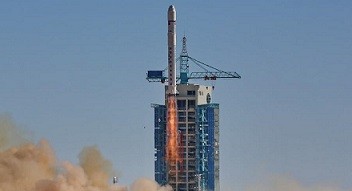The National Space Science Center under the Chinese Academy of Sciences has announced that it is ready to launch a series of scientific satellites later this year and next, the Xinhua News Agency reported.
Wu Ji, the center's director, said that they will be launching the first of the series of the dark matter particle explorers from the Jiuquan Satellite Launch Center in northwest China at the end of the year.
Wu said that they have completed all the major tests and experiments and have set up a mission control center for the scientific satellites in Huairou, a suburb in Beijing.
Chang Jin, chief scientist of the project, said that the dark matter probe will be used to observe the direction, energy and charge of high-energy particles in space.
According to the report, the Chinese probe will have the widest observation spectrum, compared to any other probe in the world.
The probe will be launched to observe dark matter, one of the most important mysteries of physics. Scientists believe in the existence of the dark matter based on the law of universal gravitation, but have never directly detected it, the report said.
The report added that the satellite for quantum science experiments will be launched by China next year.
"It's difficult to develop the payload of the satellite. We have overcome many difficulties in making the optical instrument. We are confident of launching it in the first half of next year," Wu said.
In the first half of 2016, China will launch a retrievable scientific research satellite, SJ-10, which will carry out research in microgravity and space life science that will provide scientific information to support manned space missions.
The SJ-10 project is jointly developed by 11 institutes of the CAS and six Chinese universities in cooperation with the ESA and Japan Aerospace Exploration Agency.
The center said that the planned launch next year will include a hard X-ray telescope, which will observe neutron stars, black holes and other outer space phenomena based on their X-ray and gamma ray emissions.



























